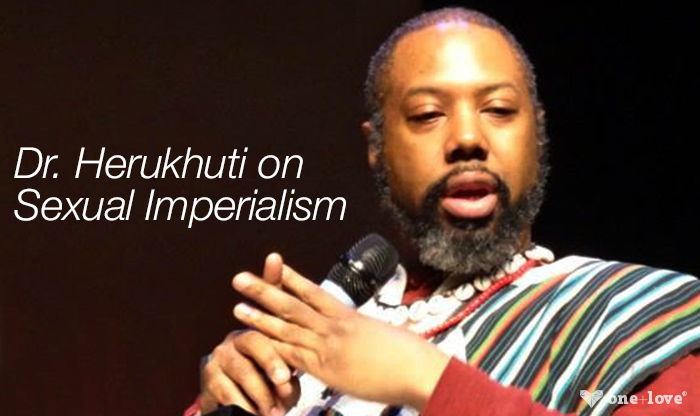
Dr. Herukhuti On Sexual Imperialism, Homonormativity, & Bi-Erasure
Reading Dr. Herukhuti’s “Bi Erasure Is Soul Murder: The Quest for Bi Culture,” along with hearing him wax fire-eloquent in a HuffPost Live conversation on bi invisibility, spurred me to ask him to share his incisiveness here at One+Love. He didn’t disappoint. Hear his diamond-sharp riffs….
On “sexual imperialism” and homonormativity:
Sexual imperialism is manifested in a number of ways in the history of European colonialism. It has meant that non-European people have been the targets of European fantasy; projected desires; guilt and shame; and scientific surveillance and experimentation. People of European descent have placed our genitalia on display, experimented upon our bodies, created theories of sexuality based upon the perceived differences between us and them, etc.
In the contemporary moment, sexual imperialism also looks like the campaigns the U.S. religious right has fermented in Africa to encourage religious intolerance toward homosexuality. It also looks like what Professor Ibrahim Farajajé calls “rainbow flag imperialism” — a sexual imperialism in which LGBT people of European descent direct campaigns into Africa to encourage queer folks in Africa to adopt Western ways of being queer. This is how homonormativity is created, perpetuated, and maintained.
Both the U.S. religious right and the mainstream LGBT movement tend to ignore the indigenous forms of sexual and gender diversity that have existed in Africa for millennia.. The religious right’s efforts depend upon the colonial roots that Christian missionaries planted in Africa centuries earlier. The mainstream LGBT movement’s efforts depend upon the neoliberal capitalist roots planted by multinational corporations and NGO missionaries decades earlier.
So we now have zealot African Christian converts leading the intolerance and violence against other Africans, using the language of indigeneity and authenticity but based upon their indoctrination into Western forms of Christianity. And Africans in urban settings who may be invested in Westernization and looking for models of queerness outside of traditional forms because of the ways Western forms of queerness are promoted in Western-controlled popular media. In both cases, you have people of European descent telling African people what is and is not good for them.
One of the main conflicts between Western homosexuality and African cultural values is about procreation. African cultures value children for a number of reasons. And people have responsibilities to the community to produce children. Western homosexuality poses a threat to those responsibilities, particularly for people who do not have access to the wealth and privilege of Western technologies to produce children outside of reproductive sex. Bisexuality, the ability to be sexually open or engaged with people across a number of genders, does not pose those same challenges to the responsibilities that African people have. Historically, bisexuality has been practiced in Africa in a variety of forms. Because Western bisexuals and people of African descent in the West have been traditionally marginalized by mainstream gay activists, the bisexual aspects of African sexualities have either been mislabeled “gay” (i.e., bi-erasure) or have been ignored (i.e., bi-invisibility).
On why bi-erasure is so entrenched and pervasive:
I think bi-erasure is so entrenched and pervasive because of the strategy of mainstream Western gay movement activists. Their strategy was to promote a representation of queerness that was not queer in the ways queerness means “different” or “askew.” Their strategy was an assimiliationist agenda. They chose to pursue an agenda to make heterosexuals believe that queer people were just like them. To do so, they had to make queer people appear just like heterosexuals but, too often, they were willing to settle for making all queer people appear to be just like gay, middle-class men of European descent. This kind of work meant that mainstream Western gay movement activists had an ideological and strategic motivation to engage in bi-erasure, respectability politics, and whitewashing. They continue to be informed by that motivation, which is why you see no mention of polyamorous relationships in mainstream marriage equality materials, bisexual people prominently positioned in HIV prevention policy decision-making, or bisexual or trans people in leadership positions at any national organization that is supposed to serve LGBT people — and definitely no bisexual or trans people of color in senior leadership/management positions.
On how his upcoming anthology will challenge misconceptions of black bisexual men:
RECOGNIZE: The Voices of Bisexual Men is a collection of short fiction, poetry, creative nonfiction, personal narratives, critical essays, and visual art produced by cisgender and transgender bisexual, pansexual, polysexual, and fluid men from the United States, Canada, Chile, India, Spain, Sweden, and the United Kingdom. Sixty-one contributors — ranging in age from 20 to 77 years old — cover the themes: identity; challenging labels; liminality; institutions; angst, anger and critique; bodies and embodiment; religion and spirituality; traveling and relationships. This compelling anthology — which also includes a resource section — is a significant contribution to literature available about and by bisexual men and expands our understanding of how bisexuality is lived by men across race, class, gender, age, and nationality.
The anthology will challenge so many misconceptions about bisexual men — e.g., our existence; the ways in which we are visible as bisexuals in our families, communities, and organizations; the degree to which we practice monogamy or polyamory in our relationships; the lives that we live; and our commitments to sexual and gender justice.

Recent Comments